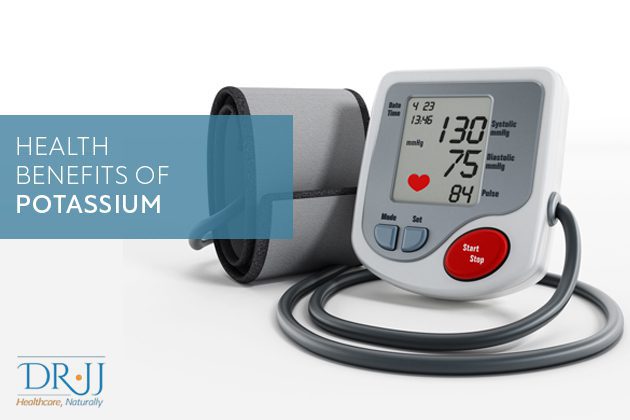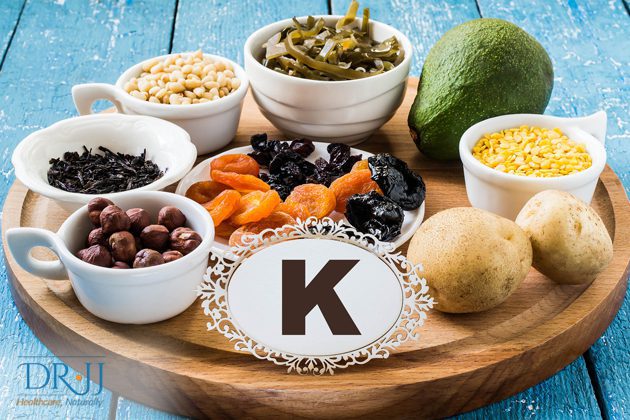
Potassium plays an important role in a wide variety of your bodily functions.
From blood pressure regulation to nervous system support; potassium can do it all.
In fact, you wouldn’t be able to live without it.
It even has an impact on your sexual health.
As a men’s sexual health naturopathic doctor, I often remind my clients to watch their potassium intake as a method to improve their sexual health.
Potassium truly is a mineral that packs a whole lot of punch.
It stands as the third most common mineral found in your body, following calcium and phosphorus.
But despite its abundance, potassium isn’t naturally produced.
Rather, your potassium levels are maintained through the foods and drinks you eat.
But what happens when your potassium levels drop too low?
Or, alternatively, raise too high?
And further, why exactly is potassium so important in the first place?
Keep reading to find out.
What Is Potassium?
About 98% of the potassium in your body can be found in your muscle cells, as well as your liver, bones, and red blood cells.
In addition to being a mineral, potassium is also commonly referred to as an “electrolyte”.
Electrolytes are substances which help carry electrical charges, or messages.
These electrical messages travel throughout your body and support several functions, including:
- Blood pressure
- Water balance
- Muscle contractions
- Nerve impulses
- Digestion
- Heart rhythm
- pH balance
- And much more
RELATED: Digestive Disorders Naturopathic Doctor
Since it’s not naturally produced by your body, it’s important to maintain your potassium levels through your diet.
Dietary Sources Of Potassium
Most people get their daily dose of potassium through the foods they eat.
Fortunately, there are plenty of potassium rich foods to choose from.
These include:
- Leafy greens
- Carrots
- Potatoes
- Acorn and butternut squash
- Broccoli
- Beet greens
- Avocado
- Bananas
- Kiwis
- Cantaloupes
- Oranges
- Tomatoes
- Raisins
- Dried apricots
- Cashews
- Almonds
- Beans
- Lentils
- Yogurt
- Dairy
- Plant based milks
- Chicken
- Salmon
As you can see, it’s not terribly difficult to get enough potassium in your diet.
But in some cases, you may need to take potassium supplements – more on that later in this article.
Potassium Benefits
Now that you’ve read a bit about potassium, you might be wondering about its benefits.
In truth, if we were to discuss all of potassium’s benefits in a single article, it’d be several pages long.
So instead, let’s focus on some of potassium’s key benefits.
1. Potassium Is An Electrolyte
We briefly discussed electrolytes while defining potassium.
To recap, electrolytes are substances which produce either positively or negatively charged electrical ions once dissolved in water.
In potassium’s case, these ions are all positively charged, and create electrical impulses which power a whole range of your bodily functions.
For instance, they help with fluid balance, nerve signals, and muscle contractions.
Therefore, many complications can arise from having too few or too many electrolytes.
2. Potassium For Nervous System Health
Your nervous system is responsible for sending messages between your brain and the rest of your body.
These messages help to maintain a variety of functions, including muscle contractions, heartbeat, and body reflexes.
They are powered by nerve impulses, which are triggered by sodium ions moving into your cells as potassium ions move out.
This exchange triggers a voltage change in your cells, and your nerve impulses are subsequently activated.
Therefore, a significant drop in potassium levels can drastically alter this process.
Getting enough potassium can help maintain this process and keep your nerve function healthy.
3. Potassium For Healthy Blood Pressure
High blood pressure is a major risk factor for heart disease, the number one cause of death worldwide.
If you have high blood pressure, you likely already know that sodium can raise your blood pressure levels quickly.
But did you know that potassium can help to lower it?
Research shows that a potassium rich diet can help to remove excess sodium from your system and subsequently help to lower your blood pressure.
RELATED: Naturopathic IV Therapy For High Blood Pressure In Toronto
4. Potassium For Healthy Muscles
The nerve impulses of your nervous system are responsible for regulating muscle contractions.
When your blood potassium levels are unbalanced, this process is hindered.
Subsequently, the nerve impulses are interrupted, and your muscle contractions weaken.
This includes your most important muscle: your heart.
This condition is known as “heart arrhythmia” and can become fatal.
When your heart isn’t beating properly, it can’t pump blood into your vital organs, brain, and muscles.
Therefore, potassium is incredibly important for a healthy heartbeat and overall health.
5. Potassium For Sexual Health
Men, if you’re dealing with sexual health issues, it might help to eat a banana or two.
We mentioned potassium is important for your muscles and your heart, and of course you’ll be using both of those during sex.
But beyond that, low potassium levels can lead to erectile dysfunction.
It does this by affecting blood flow.
Potassium plays a role in your blood vessels dilating and constricting.
Remember our talk about potassium and muscle health?
Well, your body uses multiple muscles in order to get and maintain an erection.
When you get an erection, it’s partially because potassium is able to do its job there.
Without potassium, your blood vessels may be restricted from properly dilating, which means you’ll have reduced blood flow to your penis.
This can cause erectile dysfunction.
Misusing recreational drugs, alcohol, or caffeine can all have a negative impact on your potassium levels as well, and, in turn, your sex life.
So, why not pick up some potassium today for a sexier tomorrow?
Your partner(s) will thank you for it.
Can You Overdose On Potassium?
When your kidneys are healthy, they work to remove excess potassium through urine.
However, certain conditions may interfere with this process and contribute to a potassium overdose, otherwise known as hyperkalemia.
An abnormal heartbeat (heart arrhythmia) is the most common symptom of hyperkalemia.
However, mild cases may not produce symptoms.
Severe cases of hyperkalemia may lead to death.
Thankfully, this condition is rare in people who eat well balanced diets.
Nonetheless, certain factors may increase your risk of experiencing hyperkalemia.
These include:
- Taking too many potassium supplements
- Kidney disease
- Exercising for too long
- Cocaine use
- Drugs that keep potassium in your body, such as potassium sparing diuretics (e.g. Amiloride, spironolactone, triamterene)
- Chemotherapy
- Diabetes
- Severe burns
Symptoms Of Potassium Deficiency
Conversely, hypokalemia occurs when your blood potassium levels drop too low.
In minor cases, such as when your potassium levels temporarily drop after a workout, you may not experience any symptoms.
However, severe hypokalemia can quickly become life threatening without treatment.
Signs of severe hypokalemia may include:
- Excessive fatigue
- Muscle spasms, weakness, or cramping
- Heart arrythmia
- Constipation, nausea, or vomiting
Certain conditions may increase your risk of experiencing hypokalemia.
These include:
- Kidney disease
- Using too many diuretics
- Excessive sweating, diarrhea, and vomiting
- Magnesium deficiency
- Certain antibiotics, such as carbenicillin and penicillin
- Being a high performance athlete
RELATED: Naturopathic IV Therapy For Athletes
RELATED: A Naturopathic Approach To Sports Nutrition
RELATED: A Naturopathic Approach To Recovering From Sports Injuries
Should You Supplement With Potassium?
If you have severely low potassium levels, a potassium supplement may be an option.
However, most people can get enough potassium through diet alone.
Take a look at the list of options above, and make sure you’re getting plenty in your diet.
But if you’re concerned about your potassium levels, I’m always here.
Questions? Ask Dr. JJ!
Are you a high performance athlete worried about your potassium levels?
Or, did you see some of those symptoms of potassium deficiency and wonder if you’re at risk?
I’m Dr. JJ, a naturopathic doctor in Toronto, and I’m here to help.
Book your appointment with me, Dr. JJ, today and get started on a healthier tomorrow.
If you have questions about naturopathic medicine, or you’d like to take your first step into the world of naturopathy, contact me, Dr. JJ, and let’s book an appointment.
Yours in health,
Dr. JJ Dugoua, Naturopathic Doctor
600 Sherbourne St, Suite 315,
Toronto, ON M4X 1W4
-https://goo.gl/maps/6VDXwiCihRpDRo5A9
Dr. JJ Dugoua is a naturopathic doctor in Toronto and has a PhD in Pharmaceutical Sciences. His clinic provides solutions for many health concerns and has a special focus on thyroid health issues.



